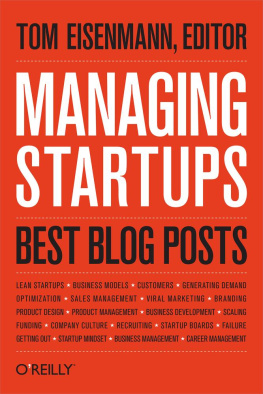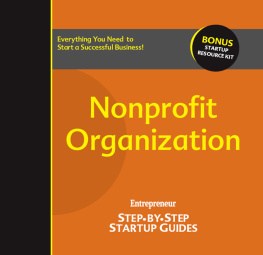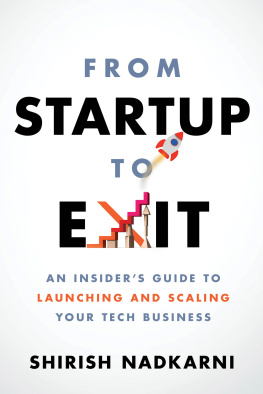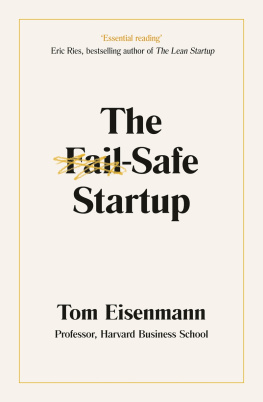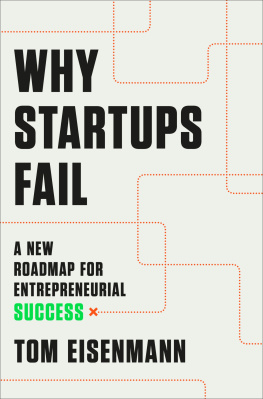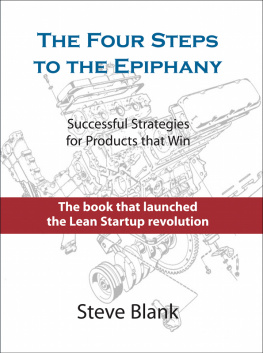Safari Books Online (www.safaribooksonline.com) is an on-demand digital library that delivers expert content in both book and video form from the worlds leading authors in technology and business.
Technology professionals, software developers, web designers, and business and creative professionals use Safari Books Online as their primary resource for research, problem solving, learning, and certification training.
Safari Books Online offers a range of product mixes and pricing programs for organizations, government agencies, and individuals. Subscribers have access to thousands of books, training videos, and prepublication manuscripts in one fully searchable database from publishers like OReilly Media, Prentice Hall Professional, Addison-Wesley Professional, Microsoft Press, Sams, Que, Peachpit Press, Focal Press, Cisco Press, John Wiley & Sons, Syngress, Morgan Kaufmann, IBM Redbooks, Packt, Adobe Press, FT Press, Apress, Manning, New Riders, McGraw-Hill, Jones & Bartlett, Course Technology, and dozens more. For more information about Safari Books Online, please visit us online.
How to Contact Us
Please address comments and questions concerning this book to the publisher:
| OReilly Media, Inc. |
| 1005 Gravenstein Highway North |
| Sebastopol, CA 95472 |
| 800-998-9938 (in the United States or Canada) |
| 707-829-0515 (international or local) |
| 707-829-0104 (fax) |
We have a web page for this book, where we list errata, examples, and any additional information. You can access this page at http://oreil.ly/managing-startups.
To comment or ask technical questions about this book, send email to .
For more information about our books, courses, conferences, and news, see our website at http://www.oreilly.com.
Find us on Facebook: http://facebook.com/oreilly
Follow us on Twitter: http://twitter.com/oreillymedia
Watch us on YouTube: http://www.youtube.com/oreillymedia
Foreword
Tom Eisenmann, Editor
Since 2009 Ive been publishing an annual compilation on my blog, Platforms & Networks, of what I deem to be the years best posts by other authors about the management of technology startups. Readers have asked me to collect the posts in an ebook, so I was very happy when OReilly Media offered to do this. I was pleased, as well, to be able to donate my profits from the project to Endeavor Global, a terrific organization that supports entrepreneurship in emerging markets.
What I do . In my annual compilations, Ive steered clear of news about product launches and funding rounds; likewise, I dont include posts that analyze trends in technologies or markets (e.g., big data, cloud computing, SoLoMo services). Instead, my focus has been on the management tasks that entrepreneurs must undertake when they search for a viable business model and then scale a startup. These tasks include the work done in the engineering, product management, marketing, sales, and business development functions. I pay special attention to ways in which functional managers leverage lean startup management practices. My compilations also cover a range of organizational issues; for example, dealing with cofounder tensions, recruiting and career planning, managing company culture, structuring the startup team, pacing the introduction of formal management systems and processes, working with the board of directors, and coping with the psychological pressures that inevitably confront entrepreneurs. Finally, I track developments in capital markets that are relevant to the management of tech startups; for example, the ebbs and flows of valuation bubbles and the proliferation of incubators and seed-stage funds.
Why I do it . Im a business school professor who works closely with students aspiring to launch a startup or to work for one. My students are hungry for practical advice, and Ive found that they learn a lot when I steer them to the wealth of insight available on the Web. As an educator, I feel fortunate to work in a field where practitioners are so eager to pay it forward by sharing their experiences and ideas. Over time, I started collecting posts for my own reference, and for sharing with my students. It was a natural step to curate these posts and publish the compilations. I discovered that there was interest in the lists that Id curated in the broader entrepreneurship community.
How I do it . Readers of my blog have asked how I pick the posts for my annual compilations. Theres no science in my approach: I dont use an algorithm that tracks traffic or social media mentions. Rather, I regularly read a few dozen blogsmostly written by entrepreneurs and venture capitalistsand I follow links to other posts that look interesting. My criterion for flagging a post for future reference is simple: did I learn something that seems worth passing on to my students or to current entrepreneurs? When I publish my compilation, I ask readers to suggest other posts that Ive omitted, and I always get some great additions. Im sure, however, that Ive missed plenty of posts that deserve to be included, and I apologize to their authors.
I want to thank all of the individuals who gave permission to have their work republished here. The generosity of the startup community is amazing, and these posts are invaluable to those of us who teach and coach aspiring entrepreneurs.
Part I. Lean Startup
Chapter 1. How We Fooled Ourselves into Delaying Our Startups Launch
Vinicius Vacanti
I remember reading the first few pages of Steve Blanks book, The Four Steps to the Epiphany , and thinking two things:
Soon after, I started attending the Lean Startup meetup in New York and reading Eric Reiss writings. I was a believer.
One of the main principles is to release an early prototype of your idea to potential users to get their feedback.
But, despite being all in on the Lean Startup movement, we didnt do that.
Why Didnt We Release an Early Prototype?
Our current idea, Yipit, would find all the deals happening in your city (sample sales, happy hours, retail discounts) and would send you an email with the best seven, based on your interests and your location.
It would have taken us just a week to launch an early prototype.
We could have measured success based on whether people opened and clicked on the emails. We could have manually created the emails with deals we found and used MailChimp to send them out. There was no need to build any tech infrastructure.

